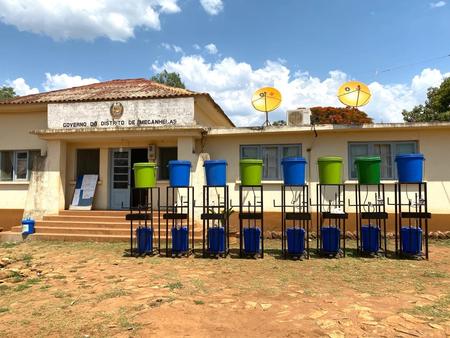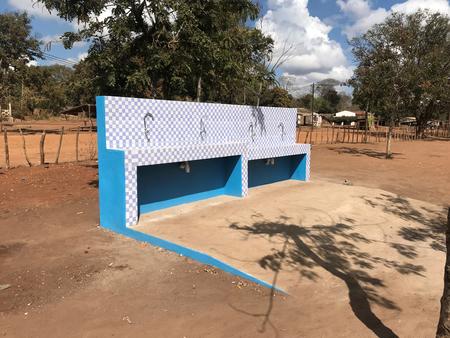Untapped: one project, two countries, three everyday essentials

At the end of a remarkable three-year project, Bert Tolhurst, UK Aid Match programme manager, reflects on how WaterAid’s Untapped project adapted to the challenges of a global pandemic to bring clean water, decent toilets and good hygiene to thousands of people in Mozambique and Sierra Leone.
In the winter of 2017/2018, WaterAid told the story of a community in the village of Tombohuaun, eastern Sierra Leone, highlighting what it means to live without clean water, decent toilets and good hygiene. Through that appeal, named Untapped, we asked the UK public for their support to bring these essentials to Tombohuaun and other rural communities like it. The response was overwhelming. Untapped was one of our biggest and most successful appeals so far. It raised £4.2 million, of which £3.9m was matched by the UK government.
We invested this additional funding in a new three-year project. It would improve access to water, sanitation and hygiene (WASH) for 94,000 of the poorest and most marginalised people in Sierra Leone’s Kenema and Pujehun districts, and Mozambique’s Mecanhelas and Cuamba districts. We prioritised children, pregnant women, newborn babies, the sick and older people.
A 360-degree approach
To have a lasting impact, we wanted this project to improve WASH access from every angle. Working at the heart of communities, schools and health centres, we:
- Built new and repaired existing WASH facilities
- Promoted healthy hygiene behaviours
- Empowered communities to understand and claim their rights to WASH
- Worked to improve the coordination and governance of the broader WASH sector
By taking such a holistic approach, we aimed to meet the immediate needs of communities, while creating a stronger and more accountable system for the future. The physical infrastructure – the boreholes, water supply systems, handwashing stations, toilets, pumps and pipes – are more effective and last longer when they are supported by a well-functioning WASH sector, good management and empowered communities who know and demand their rights. Hygiene behaviour is also critical to the sustainability of all our work, but it became particularly urgent during the Untapped project as a deadly new virus emerged.
And then came the pandemic
The COVID-19 crisis emerged halfway through the project in the spring of 2020, disrupting the work and threatening the health and safety of our staff, partners and the communities with which we work. As countries entered various lockdowns, we closed our offices in both Sierra Leone and Mozambique, and staff started to work from home. Restrictions on travel and physical contact meant that many activities had to slow down or stop while we worked out how to proceed.
Our first step was to understand what the project could and should do differently within the original budget and timeframe. We worked closely with the donor (FCDO) and our partners to understand what was possible. Our priorities were to continue delivering lifesaving WASH services, reduce transmission of the virus, and keep our staff, partners and communities safe. With a substantial hygiene component, Untapped was well positioned to adapt.
We quickly developed a revised approach which aimed to increase the supply of clean water to vulnerable communities through additional low-cost infrastructure. This revised approach also involved enhancing and re-focusing our hygiene behaviour change work to include government-approved COVID-19 messaging on handwashing and social distancing, and supporting government-led emergency coordination and monitoring.
Bringing hygiene to the fore
As the health emergency in both countries intensified and more restrictions were imposed, our teams turned their attentions to what could be done practically and safely. One of their immediate priorities was to install additional handwashing stations in public places and distribute hygiene kits to health centres. We also introduced mandatory COVID-19 safety protocols, including the use of PPE and social distancing, to protect staff and construction teams.
To promote good hygiene behaviours, we worked with local radio stations to broadcast messages and with local mobile network providers to send information by text message. We also trained local community activists and town criers to promote healthy hygiene behaviours in our target communities through door-to-door visits and by megaphone. And in schools and health centres we trained more students and staff on hygiene and infection prevention. Our work in schools became especially urgent as they re-opened and prepared for exams.
Counting our achievements
The Untapped project ended in July 2021. Despite the unprecedented disruption caused by the global pandemic, we achieved more than we expected. With the money raised through our Untapped campaign, we built or repaired WASH facilities in 121 communities, 25 schools and 20 health centres. This meant that 98,690 people could access clean water and 77,561 could access decent toilets. Thanks to the project’s enhanced focus on hygiene, 65,838 people adopted good hygiene behaviours, including 7,239 students and 219 healthcare staff that received hygiene training.
To improve WASH planning and coordination, the project successfully re-established regular cross-sector WASH forums in both countries. Through training and mentoring, it also supported 10 community-based organisations to participate in those forums and lobby their governments for improved WASH provision. A further 96,000 people received training about the human rights to water and sanitation.
These achievements are key to helping communities take control of their own development and reduce the spread of COVID-19. They also demonstrate the resilience and adaptability of our country teams and partners at a time of crisis. Quick thinking, flexibility and creativity ensured that essential work could continue when it mattered most.
Bert Tolhurst is WaterAid's UK Aid Match programme manager
Top image: A circular water pump in Tombohuaun, Kailahun District, Sierra Leone.





